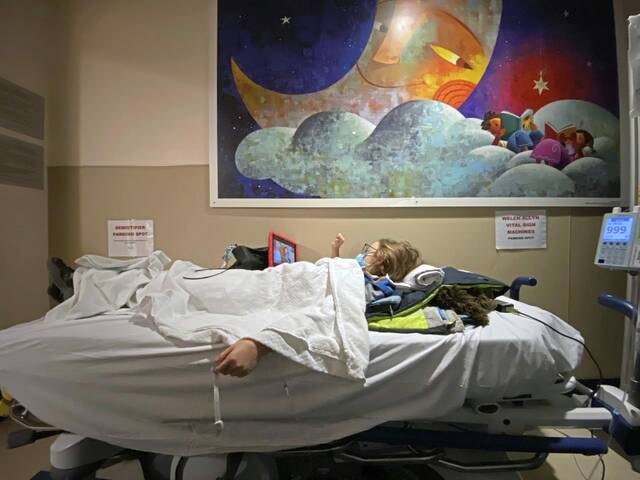Our lives changed with a headache. I checked my 10-year-old son Gus’ forehead and found it burning. It was the week before Halloween 2021, and the FDA had not yet approved vaccines for children his age. We had been living with the pandemic for a year and a half by then, but now it was knocking at our door.
Since the beginning of the pandemic, we have heard that covid is mild in children. And at first it seemed so for Gus. But on the sixth day of his illness, I took him to the pediatric ER for chest pain. Several days later, we returned to the ER when his legs became too weak for him to walk or even stand. The ER was overflowing: we spent 12 hours waiting in a storage alcove with a bed and chair shoved inside. Gus was admitted and returned home with a child-size walker.
It has now been over two months since that first headache, and Gus still has not recovered. While it is true that covid is mild in most children, we now know that children can be affected by long-haul covid just like adults.
The U.K. Office of National Statistics found that nearly 10% of children younger than 11 were still experiencing symptoms after five weeks. Another U.K. study found that 1.8% were still having symptoms after eight weeks. Those percentages may seem small, but with millions of children getting infected, many children will fall into those percentages. And we must remember that behind these statistics, there is real human suffering.
Though Gus has regained his ability to walk independently, he is severely deconditioned. His headaches and chest pain are debilitating. Going from his bed to the couch leaves him exhausted and out of breath. Simply standing up sends his heart rate rocketing as high as 175 beats per minute.
Gus’ world has shrunk to the small sphere of our Manhattan apartment. He has missed two months of school and has not played with friends for an entire season. A child who loved to scale rocks in Central Park, he no longer even has the energy to go outside to our front step. At first he asked me every day when he was going to feel better again. Now he no longer asks.
Our lives revolve around medical appointments: cardiology, pulmonology, physical therapy, neurology, infectious disease. My son’s doctors have been compassionate, but no one knows much about long covid yet, and even less so its pediatric form.
Though many politicians seem invested in pushing the narrative that covid does not harm children, or that pediatric complications are so rare that they don’t matter, my son and others like him prove this is far from true. Omicron has caused record-high pediatric hospitalizations. Covid can leave children with heart and lung damage, neurological complications, dysautonomia and other debilitating effects. A recent observational study suggested kids who contract covid are at a significantly increased risk of developing diabetes. And kids are uniquely vulnerable to a life-threatening but poorly understood post-covid condition called multisystem inflammatory syndrome in children (MIS-C).
Every time a child is hospitalized or develops a chronic illness, it reverberates through their family and community, and into that child’s future. The pandemic is a mass disabling event, and a collective trauma, that profoundly affects our youngest members of society. Yet the pain of kids like Gus has largely been brushed aside.
Children who suffer from long covid and other complications from the virus will need long-term support from professionals in fields such as medicine, mental health, social work and education. Parents will need help navigating our confusing health care system, financial assistance for their children’s medical care and workplace policies that allow them to care for their child. Our government can fund programs at state and federal levels to help these children and their families.
And importantly, we need to support research into the long-term effects of covid on children. Much of the research into long covid and other complications focuses on adults, but kids aren’t just mini grown-ups. Covid is going to be with us for a long time, and it’s vital that we learn more about how it affects children.
But we can’t tackle any of these issues if we keep pretending that covid doesn’t harm children. Kids are among our most vulnerable and powerless members of society, and they need us to see their suffering. It would be a profound moral failing to turn our eyes away.
Rebecca Saltzman’s writing has been published in The New Yorker and McSweeney’s.








